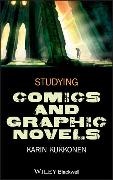Read more
Today's comics and graphic novels tackle serious themes and win Pulitzer prizes. This guide introduces their distinctive characteristics, traces their historical development, and analyzes their narrative structure. An ideal course book, the text includes material on sub-genres, such as autobiography and literary adaptation, and deploys the principles of cognitive science to explore how we respond to texts that fuse visual and linguistic storytelling techniques.
Studying Comics and Graphic Novels includes study activities, assignments, and essay questions on each topic as well as an extensive glossary and list of prominent comic and graphic novel publications, making this an invaluable student resource.
List of contents
Acknowledgments vii
Introduction: How to Use This Book 1
What This Book Holds 2
Working Definitions 4
1 What's in a Page: Close-Reading Comics 7
Cognitive Processes and Critical Terms 7
Navigating the Comics Page 16
Entering the Storyworld and Meeting its Participants 19
Comics Analysis - A Basic Checklist 26
2 The Way Comics Tell it: Narration and Narrators 31
Showing and Telling 31
Story, Discourse, and Plot 34
The Narrator 39
Narration, Focalization, and Point of View 44
Narrative as Meaning-Making 48
Graphic Narrative - A Basic Checklist 49
3 Narrating Minds and Bodies: Autobiographical Comics 55
Style and Subjectivity 55
Autographic Agents 57
Embodiment 60
Self-Reflexivity 61
Time, Story, and History 65
Alternative Agendas and Authenticity 68
4 Novels and Graphic Novels: Adaptations 73
Transporting Stories 74
Media Affordances and Adaptation Strategies 75
Fidelity in Adaptation 80
Literary Complexity 85
The Page Revisited 90
5 Comics and Their History 99
The Beginnings of Comics History 99
Precursors in Emergent Mass Culture 102
Newspaper Comics (1900s-1930s) 103
The Comic Book (1930-54) 106
Comics Censorship (1954) 110
Comics as Popular Culture 113
Breaking the Code 1: Pop Art and Underground Comix 117
Breaking the Code 2: The British Invasion 118
6 The Study and Criticism of Comics 123
Resources for Studying Comics 123
Access to Comics Texts 123
Critical Work on Comics 124
Critical Approaches to Comics 125
Comics Semiotics 126
Comics Narratology 128
Cognitive Approaches to Comics 129
Historical and Auteurist Approaches 131
Cultural Studies and Gender Studies 133
Psychoanalysis 134
How to Write Your Essay on Comics 139
The Crime Scene 142
The Witnesses 142
Making Your Case 144
End Credits 146
Conclusion: Comics as Literature 149
Appendix: More Comics and Graphic Novels to Read 155
Glossary 167
Index 179
About the author
Karin Kukkonen is Balzan Postdoctoral Research Fellow at St John's College, University of Oxford, UK. Her research focuses on the emergence and development of comics as a narrative form during the twentieth and twenty-first centuries. Dr Kukkonen has published work on metaphors, metafiction, and multi-perspective storytelling in comics. Her recent monograph, Contemporary Comics Storytelling (2013) examines how the comics of recent years engage with the legacy of postmodernism.
Summary
This introduction to studying comics and graphic novels is a structured guide to a popular topic. It deploys novel cognitive approaches to analyze the importance of psychological and physical aspects of reader experience and features activities and exercises throughout.

